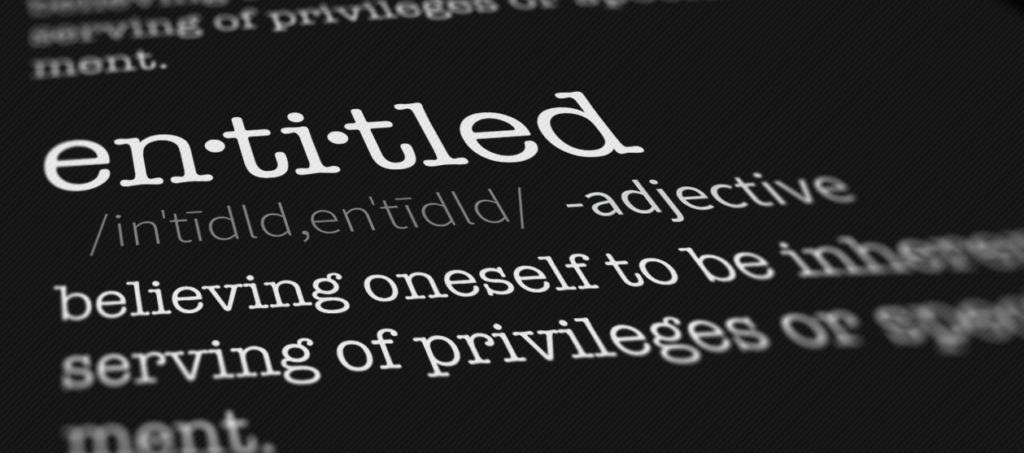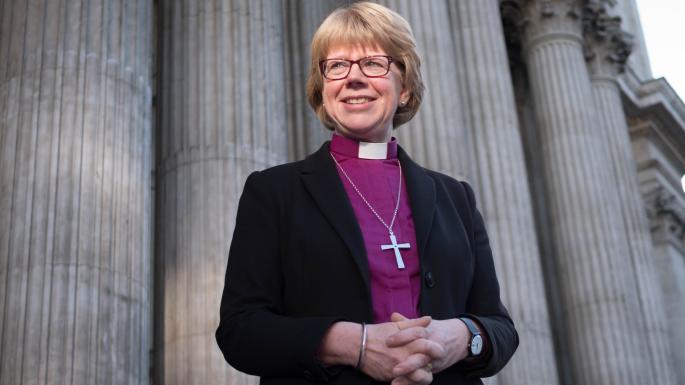
I imagine that there are few people who have escaped the news and speculation concerning the now ex-Prince Andrew and the wider Royal Family. I have no intention here of looking at this extensive coverage of Andrew’s woes, but I would like to consider a single word which is the title of a book about the former Duke of York and his family. The word I am referring to is ‘entitled’. It describes an attitude to life which is a common by-product of having almost unlimited privilege and wealth granted to an individual. The word normally carries a negative connotation. It implies that the individual who is indulged and has access to privilege without limit in one area of life, expects somehow that they should awarded similar treatment everywhere else. The toddler who never learns the meaning of restraint from his/her parents will often grow up to be insufferable as a child. Such children are described as ‘spoilt’ and the damage to them is often carried right through to their adulthood. The spoilt child becomes the spoilt and entitled adult, though the areas of early over-indulgence are not necessarily to do with material wealth and possessions.
Many people might consider that to have access to unlimited wealth and privilege is something highly desirable. Indeed, we can understand how the burdens of debt and poverty suffered by many people make them long to be rich. Just a little of the great wealth of the privileged uber-rich would, they think, quickly solve all their financial problems. Wealth, too much or too little, is indeed a problem for many people. One group find they have insufficient to pay for what they need – food, shelter and adequate provision for families. Another group have more than enough, and thus they come to take for granted lifestyles that most of us cannot imagine. Serious problems exist for those at both ends of this spectrum. The very rich and indulged group sometimes get so used to being pampered by others that they become poor at making relationships and the ordinary skills of life which we use to manage our homes. In their small section of society, everyone seems to get by and enjoy life without expending any obvious effort. The ‘set’ they belong to dictates a style of living which promotes holidays, smart parties, alcohol consumption and constant shopping. This does not, of course describe all wealthy people but there is a solid core of rich entitled people in Britain and elsewhere who are firmly tied into a lifestyle which is determined to extract pleasure and complete self-indulgence at every turn.
The disadvantages of poverty are clear to all, but the drawbacks to wealth are less obvious. The lifestyle which leads to an individual being described as ‘entitled’ is one where there has been a forgetfulness of who and what they are and how they are still part of humanity, whether poor or rich. The entitled ones are those who have, in many cases, become disconnected from large swathes of fellow humans who struggle with massive deprivations – hunger, poverty, ill-health, mental illness or disability. To ignore the needs of others because their existence makes us feel uncomfortable is a kind of self-mutilation. We deny ourselves the sensitivity to other people’s needs in case we find that our full enjoyment of life is in some way compromised by this exposure. To put it another way, we draw in our antennae, which are designed to make us aware of need and pain in the world, to protect us and our enjoyment of material things. To be unaware of need in others or make a deliberate choice to ignore it completely is to make a kind of contract with a devil of indifference so that we hand over part of our humanity in return for a greater intensity of pleasure.
There is another word which is often associated with the word entitled and that is the word ‘deference’. Our first word, entitled, comes with an inevitable flavour of disapproval but deference is not necessarily a bad thing. At its best deference acts as a kind of social glue. In very subtle ways, it helps people to negotiate tricky areas of decorum in society so that they know what is expected of them in company. People functioning in a hierarchical structure, like the British class system, need to know how to behave to preserve their place or position. Unlike the negative ideas commonly associated with the word ‘entitled’, deference is something that can play a positive role in maintaining stability in social structures. There are numerous conventions we adhere to which show our common identification with society’s values. It is still the convention in a court of law to stand when the judge enters, and it is common practice to allow a woman to go through a door ahead of a man. Problems arise when deference becomes a negative thing – when it is demanded by men and women in places of power and wealth. In our minds we can distinguish between a valid deference which is earned by its recipients and one which is given or demanded without a proper cause. When politicians or members of the Royal Family misbehave, the deference we have traditionally held for those in high office is challenged. We allow ourselves to have the treacherous thought that people ‘set over us’ are not in fact special or morally superior. While it has been a convenient myth to ascribe social and moral excellence to those who occupy the highest ranks of society, the realities of the past few weeks show this to be far from the true situation.
As I reflected on these two words, entitled and deference, I recognised that both ideas have played a part in the way we think about the Church and its hierarchy. For good and ill we have inherited a highly complex layered organisation which allows those in the highest ranks to think of themselves as having something approaching a divine authority over others. Many years ago, I found myself studying some of the mediaeval texts that were used in the so-called Investiture Controversy that preoccupied secular monarchs and church authorities in the early Middle Ages. One particular piece of writing had enormous influence when it was brought to France in the early 9th century from Constantinople. The anonymous Greek author, known as the Pseudo-Dionysius, saw the entire cosmos, spiritual and material, as emanating down from God. In his book, the Ecclesiastical Hierarchy, the Church and its liturgies had a crucial role to play in making this downward manifestation of God visible through the act of worship. Hierarchy, priesthood and sacraments were the given means of participating in the Divine reality. Secular monarchs (even our British ones) looked to a sacramental authority to receive their kingly status. Priesthood and kingship were closely aligned ideas and many of us remember the anointing of King Charles that took place behind a screen at the hands of the archbishop and others during the 2023 coronation. This view of the world as a fixed spiritual/material reality made it easier for elites to exercise their control over societies across mediaeval Europe. The idea that there might be another way of organising society other than through divinely ordained hierarchies took centuries to be realised.
The former Archbishop of Canterbury spoke of his frustration at the way deference to authority in the church often detrimentally affected communication across the institution. My historical observations about the influence of the work, Ecclesiastical Hierarchy, may help us to understand how a form of deference reaching back centuries has been allowed to mark the way people still think about office and power within the Church. This way of thinking about an institution is not going to be healthy. It allows the leaders (bishops and clergy) to think of themselves as having moral and social authority, whether or not these have not been earned. Somehow, we have to find a way to banish the spectre of entitlement from the church. In a complicated and sometimes confusing hierarchical system which allows promotion and ambition, we find an environment where self-inflation, narcissism and hubris are sometimes given free rein. Historically we have these inherited patterns of authority which allow, in susceptible individuals, the worst forms of overbearing and bullying behaviour to be manifest. To counteract these unchristian manifestations of power, we must allow ourselves to be constantly challenging those with rank or hierarchical status to pattern themselves after Jesus. He, after all, had a great deal to say about power and rank and the way that, when they are properly exercised, the one exercising them deserves the honour, deference and respect due to them. These are the themes we come back to again and again. It is because the Church often gets things so wrong in these areas that we have allowed our reputation in the court of public opinion to slip dangerously low in recent years.



